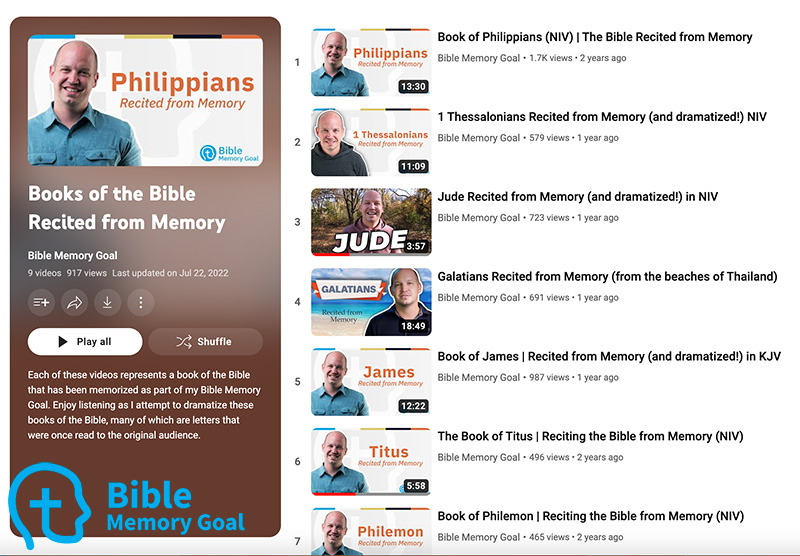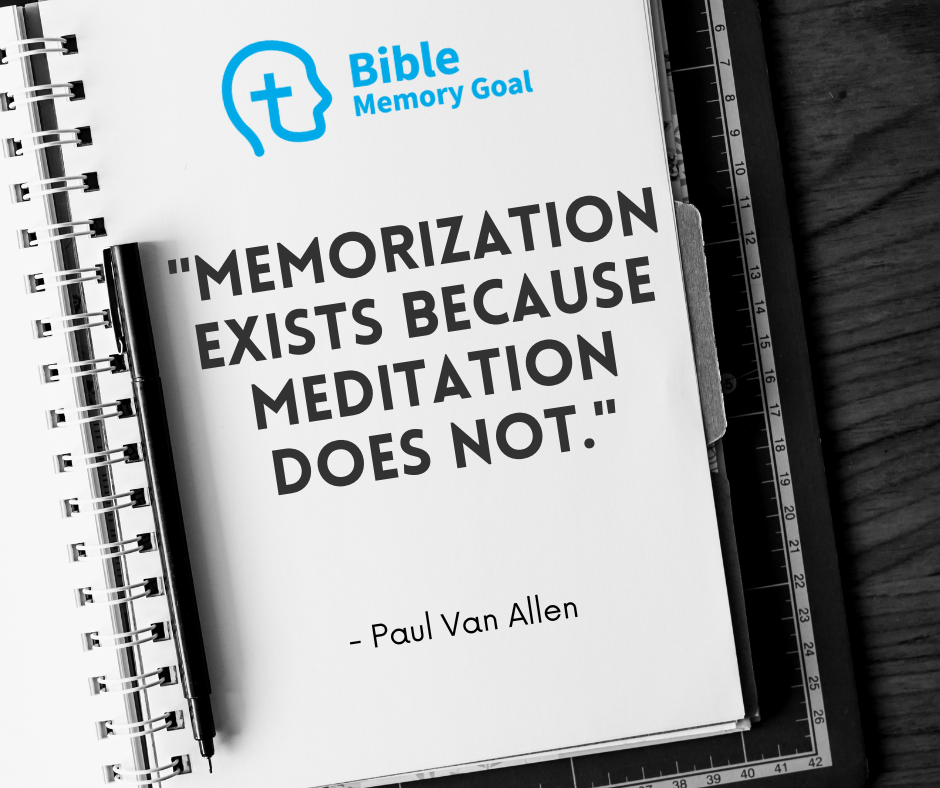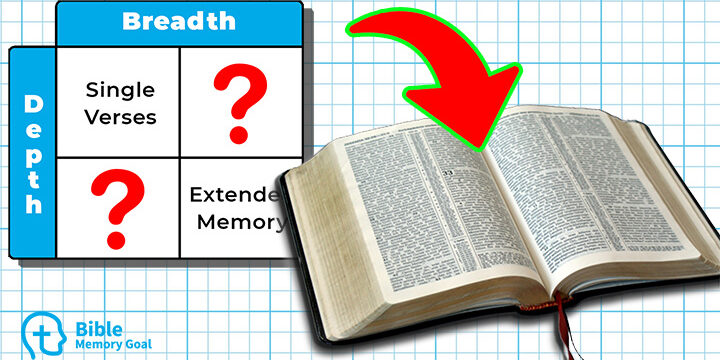There are plenty of Scripture memory techniques out there, many of which I’ve covered here on Bible Memory Goal. But what most of us fail to recognize that there are also different types of Bible memory. If you find yourself stuck memorizing random verses here or there – or if you’re getting burned out memorizing extended passages – why not try a different type of memorization?
This Scripture memory framework was developed as part of the Bible Memory Goal training, and it looks at Scripture memory on a dual axis:

- Breadth: How much Scripture is being memorized? This is the left-right axis, with the left side being fewer verses and the right being longer passages.
- Depth: How much context is provided? Memorization promotes meditation, and on this up-down axis, the top indicates limited context while the bottom is greater context and understanding of a passage.
Disclaimer: This Bible memorization framework is not meant to call out any type of Bible memory as “better” or “worse” than another. Instead, we’re trying to expand out understanding of how we can engage with God’s Word more fully.
So with the framework set, let’s look at each of the 4 types of Bible memory in detail.
1. Single Verse Bible Memory
When most people think about Bible memory, what they think about is memorizing individual verses. This is what many of us did in Sunday school at church or the extent of what we feel like we have time for as adults.
When most people think about Bible memory, they think…individual verses.
There are obvious limitations here: let’s say you have a person who only memorizes John 3:16. This is limited breadth, obviously, since this is just one verse out of tens of thousands in the Bible.
But there’s also limited depth there because that person doesn’t really have the context to understand everything about salvation, about who Jesus is and what he is talking about within that single verse.
We often offset these limitations by memorizing collections of verses. For example, let’s say we memorize the Romans road to build a better understanding of salvation. Or perhaps we memorize key verses about God’s character to understand how He interacts with us as humans.
At the end of the day, there are many benefits of memorizing single verses as long as we work to maintain a contextual understanding of what we’re memorizing.
2. Overview Outline Type of Scripture Memory
Most Christians have an embarrassingly shallow grasp of their own faith. Part of this stems from the fact that we’ve never taken the time to see the Bible, or even the individual books in the Bible, from a macro perspective.
The Overview / Outline type of Scripture memory is a way to memorize that seeks to look at the broader context of the Bible before memorizing word for word. What would this look like? A couple examples of Overview memorization would be:
- Memorizing all 66 books of the Bible
- Memorizing a summary of key Biblical narratives (example: Walk Thru the Bible)
- Memorizing the chronology of one particular book of the Bible (example from the gospel of John below).
This type of memorization covers a greater breadth of Scripture while admittedly offering very little depth.
The benefit here is that you can see the story, individual book or Bible as a whole, which acts almost like the scaffolding from which you can then fill out all the details as you study or memorize later.
3. Orality / Story as Bible Memory
More than 13% of the world is still illiterate, and although that is incredible improvement compared to even 100 years ago, that still means that millions of people around the world communicate and consume information by listening and speaking.
Orality is a type of Bible memory that emphasizes this oral tradition.
Orality adds greater depth of understanding to a select few number of verses, usually in the form of a story. Dr. Larry Dinkins gave a practical example of this kind of memorization in one of our interviews (example starts at the 5:28 mark):
When short stories and hand motions meet, retention surprisingly goes through the roof!
The benefits here are twofold:
- Rapid Memorization: Orality is a proven way to memorize Scripture quickly, since you’re utilizing many different kinetic memory techniques at once.
- Practical Application: Everybody loves a good story! Orality provides a simple way to use Scripture memory in your everyday life by giving you a database of stories that you can pull from at a moment’s notice.
The downside here is that this kind of memorization doesn’t lend itself to non-narrative portions of Scripture, such as Paul’s epistles.
4. Extended Scripture Memorization
The last type of Scripture memory is the one that most people think of as unattainable: memorizing entire chapters or books of the Bible.
When memorizing extended portions of Scripture, you’re maximizing the breadth AND depth of what you’re memorizing.
As part of my goal to memorize the entire New Testament of the Bible, I’ve recorded myself reciting each book I’ve committed to memory as a standalone video on the Bible Memory Goal YouTube channel.

There are amazing benefits to extended memorization of Scripture, but I also recognize that it’s not something that everybody enjoys doing.
Bible Memory is NOT HOLY
My friend Paul Van Allen said it well when he said this:

The act of memorizing in itself is not a holy act.
It is the process of meditating on what you’ve memorized that creates the transformation we need in our lives.
The type of Scripture memory or the technique you use to memorize are not as important as committing yourself to meditate on God’s Word day and night (Psalm 1:2, Joshua 1:8).
More Bible Memory Resources
Are you interested to memorize more of God’s Word? Check out the various resources we have available on Bible Memory Goal:
- Not sure where to start? Learn where to start with Bible memory here!
- Want to join a community? We have a great Bible memory community here!
- Want to listen to more interviews? We have amazing Scripture memory interviews here!
Also, you can find a visual explanation of these types of Scripture memory on our YouTube channel here:
Or you can listen to the Memorize What Matters podcast on your favorite player:
Listen to “The 4 Types of Bible Memory You NEED to Try” on Spreaker.


Leave a Reply